Paul Jay and Jyotishman Mudiar, host of India & Global Left, discuss and debate the war against Ukraine and the role of NATO and the US. Jay states, “NATO doesn’t exist to invade Russia. NATO exists to assert American hegemony in Europe.”
Paul Jay
The primary criminals of the world since World War II are the United States and NATO. It just can’t be not said. I don’t think NATO exists to invade Russia. NATO exists to assert American hegemony in Europe. NATO exists to make sure every European country is part of the American arms weaponry system. NATO is there to make sure that Europe never becomes a capitalist power outside of the U.S. system. NATO is there to make sure there’s never an alliance between Germany and Russia, which would become an independent power in Europe that could rival a Europe led by a German-Russian alliance. It would be the same size of economy and population, more or less, as the United States. I mean, NATO is there to assert American hegemony in Europe. I think that is its primary role.
Jyotishman Mudiar
Hello, and welcome to another episode of India and Global Left. Today we have with us Paul Jay. Paul is a journalist and a filmmaker. He is the editor-in-chief and host of theAnalysis.news, a video and audio current affairs interview, commentary show, and website. His films have won numerous awards at major festivals around the world. Paul, welcome to India and Global Left.
Paul Jay
Hi, thank you for the invitation.
Jyotishman Mudiar
Before we jump into the more political questions, can you give us a little bit of a background of the family you grew up in, the schools you went to, your background, and what brought you to the work you do so that our viewers can understand your background better?
Paul Jay
Yeah, I guess. I grew up, what they call, a red diaper baby. Both my parents were lefties. My mother was acting in Hollywood in the late 1940s, and my father was getting trained as a union organizer in L.A., although he’s from Montreal. They both left the U.S. during the McCarthy and the House of Un-American Activities Committee hearings. They got out before they could deport my father, which might have been coming. They thought it might, so then they came back to Toronto.
All that said, the McCarthyite atmosphere in Canada was much stronger than most people realize. It wasn’t as widespread in terms of people getting fired, losing their jobs, and being persecuted in front of hearings. It wasn’t as exaggerated as in the U.S., but certainly, people did lose their jobs. There was a very organized campaign during that period to purge the unions in Canada of the Left.
In fact, the CIA was very involved with a guy named Hal Banks, who ran the Seafarers’ Union in Canada. He helped organize a campaign to squash the communist-led union in Inco, which may still be the biggest nickel mine in the world. It was [inaudible 00:04:06] Mill, which was a left-wing and communist-led union in Inco and Sudbury. My father worked for that union when they came back to Canada.
So it was a period of quite a bit of anti-left, anti-Soviet, and anti-communist propaganda. I grew up watching TV shows like “I Was a Communist for the FBI.” The Cold War propaganda was very intense in Canada, even if it wasn’t as intense. In school, we would do exercises of covering our asses and hiding under our desks in case there was a nuclear war.
All that said, there wasn’t as much politics talked about in my house as one might think because of the atmosphere. At any rate, I didn’t grow up with a Cold War mentality. Issues were discussed in the news and stuff. It was, I would say, an intelligent household in terms of political conversation, but not so overtly Left as it could have been. As soon as I was legally allowed at 16 years old, I couldn’t imagine spending the last four or five years of my life in school because I was sure the world would end before I was 20 years old– Cuban Missile Crisis, the tension in terms of nuclear weapons.
All that said, I was very shaped by the Cold War, but not part of it. I’m lucky that I didn’t grow up with a Cold War mentality because it’s pretty hard not to when you grow up in North America when I did. I was born in 1951. I wasn’t that political, but the Vietnam War got me engaged. It’s a long story, but I worked for years. I worked for five years as a Carman mechanic on the railroad, fixing freight cars. I drove a truck at the post office for three, four years. I started making films when I hit around 30 years old.
Jyotishman Mudiar
This is in the ’70s and the ’80s?
Paul Jay
Yeah, I worked on the railroad in the ’70s. I worked in a punch press factory, then on the railroad on a midnight shift for five years. Post office was about three, four years. I started making films somewhere in the ’80s.
Jyotishman Mudiar
What brought you to media and film? You clearly grew up in a film family or film environment. What brought you to do media work along with the film?
Paul Jay
A series of accidents and no grand plan. My uncle was a writer, and I had different cousins that were acting. I don’t think it had anything to do with it.
When I quit high school, I went to an experimental school, and somebody donated a camera: a 16-millimeter, I think. I didn’t know what to do with myself, so I figured I’d go to film school. I got a letter from the school claiming I had finished high school, which wasn’t really true, I had the letter, and I applied for the London School of Film Technique and was accepted. So I was going to go to England for school, but they told me I was so young that I had to wait a year. I was just turning 17 or 18. Most of the people in the school were postgraduate, but they liked my little film. I had a year to kill, and I wound up going to San Francisco, L.A., and the big antiwar demonstrations in Berkeley. I opened up a nonprofit record store and waited to go to school.
As I was about to go to film school, Pierre Trudeau declared the War Measures Act after there was the kidnapping of first the High Commissioner from England, but then they let him go. Then they kidnapped and killed the Québec Cabinet Minister, the Front de libération du Québec, which was the militant organization fighting for the independence of Québec from Canada. I couldn’t imagine leaving my country in the midst of all that to go to film school. So that’s when I started all these working-class jobs, but I eventually got back to filmmaking. Once I was in it, I gravitated in that direction.
Jyotishman Mudiar
This is an excellent background, given that we are going to discuss a lot about the Cold War, Hot War, the security state, and so on. Let me start with multilateralism. A lot is going on about the de-dollarization, but it’s not just that. A lot of experiments have been pushed through recently in the Middle East and Latin America– new currency experiments. We had Vijay Prashad and a whole range of people who are much more optimistic about the emerging multilateral world as opposed to the imperial, U.S.-led, unipolar, imperial world order.
I was listening to you on theAnalysis.news, and I felt that you have some substantive criticism or caution that you flagged against the emerging multilateral institutions or the multilateral world order. Can we start with that?
Paul Jay
Sure. Well, first of all, let’s back up one step. The issue of the unipolar world, I think, was highly exaggerated. Without a doubt, global capitalism was managed by the United States. Without a doubt, it was the preeminent military and economic power, certainly, since the fall of the Soviet Union. But it’s exaggerated, I think, how much they control the world. A lot of the world had its own ideas. A lot of countries had their own plans and ambitions. The U.S. tried to manipulate the outcome of everything, but they often didn’t succeed.
How many wars did the United States win since World War II? Every major military incursion ended in a debacle. Their great victory was what, Panama? They were able to overthrow [Manuel] Noriega. Oh, I’m sorry, the other great, glorious victory was over Grenada; that was another big one. Every major military incursion in spite of the trillions of dollars and the thousand or more military bases and dominant nuclear power, every major military incursion was a debacle.
Now, the CIA and the financial blackmail and pressure the United States was able to put on countries were quite successful in some places, i.e. the coup in Iran. There are other places where the covert activities were fairly successful from an imperialist point of view. But this wasn’t a world, ever a world, that was just completely dictated by the United States.
In fact, the days of direct colonial rule were more or less over in the 19th century. There’s a famous quote about Canada from a guy named Lord Durham, I believe his name was. He says, “The colonies are a boat anchor around our neck.” The cost of direct colonial rule, and you’ll know from India, it’s way better to have neocolonialism. It’s way better to have local ruling elites who have their own interest and collaborate with the external power. But when you do that, they also have their own interests. In some countries, those local elites are not puppets. In fact, in a lot of the places, including the South Vietnamese, who were puppets to a large extent, they didn’t always do what they were told. Sometimes people like Noriega in Panama get out of control. It’s a very chaotic world. Even in the unipolar world, the Americans struggled to try to make it in their image, likeness, to their desires and often failed.
There’s another force in history. Even if the local oligarchs of Asia, Africa, and Latin America, the ruling elites, even if they’re compliant, in many, and maybe most cases, the peoples of these countries are not so compliant. People have been asking this and raising this question: “What would the United States do if Mexico accepted Chinese or Russian weapons? Wouldn’t they march into Mexico the way the Russians did?” I don’t know if they would because the Mexican people would fight back.
Why didn’t the United States invade Venezuela when Russia was sending arms and landing military planes in Venezuela’s airport? Who knows what else, in theory, Russia may have put in Venezuela? They didn’t invade Venezuela. Why? Because they’re afraid of the Venezuelan people, that’s why. They would be bogged down in a war against the whole Venezuelan people. Even sections of the opposition would have joined in a fight. So there’s another force in history.
Let’s not just talk about a unipolar world because it suggests this all-powerful United States. No, the peoples of the world, especially when they stand up and fight, they have power too. Even in the United States, the elites would love to control the outcome of everything, but look at the bloody chaos in the United States. They can’t even control what’s going on in their own country. Capitalism is in chaos. Part of that chaos, the decline of the U.S. dominant order, is the rise of, of course, China. Now they have a competing big power.
The question comes, is the competing big power and its allies, in theory, these BRICS countries, is that a countervailing force to U.S. power? That seems to be the thesis. The answer is sometimes, but other times, no.
Certainly, Brazil under [Jair] Bolsonaro couldn’t have been more collaborative with the United States, even though China is Brazil’s main trading partner.
Jyotishman Mudiar
Mhm.
Paul Jay
The Indian elites play the same game that’s been played for a long time; play different powers against each other, which means they also have their own interests. They don’t just do what they’re told. But that doesn’t mean that Indian capital isn’t completely enmeshed in Western capitalism. For that matter, so is China. These are complicated relationships. So BRICS, on the whole, is led by elites who have the same interest as the American elites, but they’re playing it from their own national interests. Sometimes that will be a good thing.
There’s a debate over whether China’s loans to Asia, Africa, and Latin America are predatory or not. Well, people like Patrick Bond and others argue that it can be quite predatory. Jayati Ghosh says, “Well, they’re not nearly as bad as what the West does.” I think both things can be true. Is it a positive that countries like Latin America have an alternative for financing? Of course, it is. If they can say to the Americans, “Look, we’re not going to accept your terms. We can go to the Chinese.” Well, that’s got to be a positive that people at least have that flexibility. On the other hand, to think that BRICS is some anti-imperialist force, I think, is an illusion. Depending on the circumstances, they will still side with the Americans when it’s in their interest or under certain kinds of pressure.
Jyotishman Mudiar
There seem to be two things at play here. One is the realm of international relations, and then there is a bottom-up view from the national countries themselves. Say, a country like India or Brazil, if not under Lula, but under Bolsonaro; these are very depressive societies, not just in terms of neoliberalism, but also right-wing forces, not now in Brazil. First, there is a problem with that as it is not as simple to be very hopeful about these institutions like BRICS, for instance.
There is a dimension of international relations where the credit market was initially completely dominated by Western foreign institutions, pension funds, mutual funds, and so on, but also so-called multilateral but unilateral institutions like the World Bank or IMF, and even for that matter, Asian development banks. There seem to be these two things. There can be skepticism about BRICS or, for that matter, these alternative arrangements looking from the prism of their own national economies. Isn’t it a step forward when we look at it from the prism of international relations, where a few institutions have entered to dominate it?
Paul Jay
We’ll see. If we were to see another American-styled invasion of Iraq somewhere or another, we’ll see to what extent they actually stand up. If they do, it would obviously be positive. In terms of giving countries some alternatives in financing, yes, it’s a positive. Is it going to stop U.S. aggression somewhere? Highly doubt it. Haven’t seen it. From time to time, these are not, on the whole, progressive people.
I think Lula, you could say, is in the progressive camp, so now Brazil is led by someone who’s relatively progressive. What he is able to actually do, we’ll see. Two-thirds of the country supports severe abortion regulation, which means two-thirds of the country is very religious. So it’s not just that he has to deal with a military that would like to see him gone and an oligarchy that would like to see him gone; it’s actually large parts of the population that are quite conservative. So we’ll see what he can do.
But if you’re saying, is there something positive in this BRICS Alliance? It has the potential to push back on some issues. When it does, great. I think the position of the BRICS countries so far– well, first of all, Russia is included in that. There’s nothing progressive about Russia. It’s oligarchy and state institutions are every bit as aggressive and bankrupt of moral legitimacy, say, as the United States. The only difference is the United States has committed far more war crimes and has a far more powerful global presence.
Let’s put it this way. This is the character of monopoly capitalism. If Canada could be the global hegemon, they would jump at it. I’m sitting in Toronto right now. If history had played out differently, and it was Canada, maybe if they’d won the War of 1812 and taken over, this is the nature of monopoly capitalism is to seek monopoly. That’s why it’s called monopoly capitalism. That means monopoly everywhere and every place that’s possible. When you’re a Canada, you can only play a junior partner, so that’s the role they play. The BRICS countries, most of them have been junior partners and may well be again; it just depends on the situation. India plays this dual role. They’ll buy a sub from the West. They’ll buy arms from Russia. In a way, that may be good, but there’s nothing progressive about [Narendra] Modi.
Let’s back up this whole conversation a step because on what criteria are we judging all these things? I think we have to say what is the fundamental problem facing us humans and then start looking at everything. So obviously, the climate crisis and the dangerous risk of nuclear war. You got to judge everything from that. So if you’re going to judge whether BRICS is good or bad, you got to judge it from the point of view of climate and the threat of nuclear war.
Well, certainly, Russia’s invasion of Ukraine has made the world far more dangerous. That’s not to say that the refusal of the United States to clearly state Ukraine will never be in NATO wasn’t a provocation. Of course it was. The Ukrainian government could have said, “We know we’re not getting into NATO in any known horizon because the Germans and French have made it clear that.” Oh, yes, we’ll recognize the aspiration, but it was clear the Germans and French were not going to say yes to Ukraine being in NATO. The Russian invasion, the Ukraine war has made the ability to have any international negotiation on climate almost impossible.
Two, the threat of using tactical nuclear weapons in Ukraine by Russia has made the world far more dangerous. The American refusal to find a compromise by taking NATO off the table, linking arms exports to Ukraine to negotiations and compromise, and focus the world on the climate crisis and nuclear arms reduction. Everything has to be judged from that.
Are the BRICS countries, this multi-polar world, getting us closer to nuclear arms reduction treaties? There’s nothing now. There’s not a single treaty that’s actually meaningful right now. Next year, there won’t even be anything. New START will be over. Americans are the worst to blame, without question– the abrogation of the ABM Treaty, and so on. We’re heading into a world with virtually no arms reduction treaties and no international climate negotiations that mean anything. COP meets every so often, and a bunch of wind goes back and forth as the scientific predictions get increasingly dire. So I don’t see the point of discussing anything going on in the world unless you start with the climate crisis and the threat of nuclear war. The multilateralism, I think the jury is out right now on whether it’s meaningful.
Of course, multilateralism is better than unilateralism. But specifically, whether the BRICS countries together are going to move us closer towards dealing with the climate crisis and dealing with the reduction of nuclear arms, certainly, Russia ain’t going to help in that direction. China, maybe. China has the potential. We’ll see if they’re serious about reducing their coal use. What is it? A new coal-fired energy [plant], four or five open up every week. They say it’s transitional. We’ll see. It’s not a cut-and-dried thing, yes or no to BRICS, but it’s certainly not some great anti-imperialist force.
Jyotishman Mudiar
I guess it seems to me, listening to you as well, that there seem to be different areas where, for instance, in the area of militarism, BRICS doesn’t seem to be an alternative at all. India and China themselves are in an arms race. That’s a place where it doesn’t look very optimistic. One can talk about the Shanghai Cooperation Organisation, but how functional that is, one can debate, and one can argue.
On the other hand, there are areas where it definitely shows some potential. One of the major crises that emerging economies are facing is the sovereign debt crisis. The sovereign debt crisis is very majorly about these institutional lenders. For that we need a multilateral credit agreement in where the PRC would be a big player in it, but it should be multilateral, and it should check these private profiteers and rentiers’ power. There may be greater hope, and so on.
Just to wrap this segment up and enter the war in Ukraine, I just wanted to quickly ask you what you think about China leading the struggle against climate change, particularly given it is said that China is capable of producing alternative green technologies at a scale and also at a price which can be affordable to much of the world?
Paul Jay
One hopes out of their own nationalist interests. They’re not a fossil fuel producer. So they’ve got no real interest in not developing sustainable energy. If you look at a map of what the world looks like at three degrees, at four degrees, where we are headed, there’s not a hell of a lot of livable China left. I think at four degrees, one map I saw shows something like two-thirds of China. There’s no agriculture left. That’s within 75-80 years, and it could be less. Every time an estimate comes out, it turns out things are going faster than we thought.
The issue of the climate crisis is the predominant issue facing humanity and nuclear weapons. The climate crisis, in less than a decade, we’re going to be at 1.5. Many, many scientists think if you hit 1.5, you can’t stop it from hitting 2, and so on. I don’t understand why China isn’t more out there.
What needs to be done is so damn obvious, and it ties to Ukraine. The U.S. and China should offer a Marshall plan to Russia to get off fossil fuel production. It’s beyond imagining, given today’s politics. On the other hand, if you work back from how do we stop this from happening, I don’t know what else there is. Unfortunately, China now has a source of even cheaper fossil fuel energy because the Russians are selling them all this stuff at a discount, which puts less pressure on China to move to sustainable.
I hope China takes the lead. Whether China is socialist or not, I tend to think it’s more like China is a capitalist country with socialist characteristics. But whatever, the label doesn’t matter too much at this point. Will China lead the way? I don’t think they’re doing it effectively now.
Instead of soft-selling this Russian invasion into Ukraine and using it for their own geo-strategic purposes because there’s no apologizing for what is essentially a war of aggression against Ukraine. This is an illegal, unjust war against Ukraine. Period. There was no imminent threat to Russia. Period. Doesn’t mean all the provocations and everything else from the Americans and the Europeans, they should be included, don’t matter, they’re a factor, but there was no imminent threat. China knows that, and they won’t come out and say it.
Instead of leading the way on Ukraine, they’re starting to make noises in that direction, but China maybe could maneuver an “honourable way out” for Putin’s government and make the whole emphasis on climate. But so far, no. So far, they’re playing a pretty conventionally capitalist foreign policy. Don’t get embroiled in this, but take advantage of it.
A socialist foreign policy would be solidarity with the workers of Ukraine and people, solidarity with the workers and people of Russia, and do everything to stop the slaughter of hundreds of thousands of people. They’re not out front doing that. It’s all a little cat and mouse. Especially given the climate, we don’t have time for that.
Jyotishman Mudiar
Your critic would say that China has been trying to come up with plans to get out of the war. It has already presented multiple proposals. Chinese ministers have travelled to both Ukraine and Russia and have been trying to negotiate something out of it. On the other hand, to ignore the fact that the West, NATO, and a whole range of others that includes formations like AUKUS, have just ganged up against China. Under such circumstances, how realistic is it for China to directly denounce Russia?
Paul Jay
Oh, I don’t even care if they directly denounce Russia or not. I don’t care if it’s done through backroom channels. China, for its own interests and the interests of the people of the world, should find a way to end the war and put the focus on the climate crisis. Listen, the primary criminals of the world since World War II are the United States and NATO. It just can’t be not said. I don’t think NATO exists to invade Russia. NATO exists to assert American hegemony in Europe. NATO exists to make sure every European country is part of the American arms weaponry system. NATO is there to make sure that Europe never becomes a capitalist power outside of the U.S. system. NATO is there to make sure there’s never an alliance between Germany and Russia, which would become an independent power in Europe that could rival a Europe led by a German-Russian alliance. It would be the same size of economy and population, more or less, of the United States. NATO is there to assert American hegemony in Europe. I think that is its primary role.
The European elites go along with it because they cash in on the American gravy train. All the Europeans make money out of the arms industry. They make money out of the exploitation of Asia, Africa, and Latin America. They’re part of the American banking system, and so on. It’s not a threat to invade Russia. NATO was already in Estonia. It’s closer to Moscow than any place in Ukraine. They didn’t bombard Moscow just because Estonia is in NATO.
The real threat to Russia is not whether Ukraine is in NATO and not even… As Dan Ellsberg says, “It wouldn’t change anything even if there were nuclear weapons in Ukraine.” It’s no different than having them in Estonia, Poland, or Romania. The real threat is American submarines that can take out virtually every major city in Russia within minutes. Ukraine has got nothing to do with it.
So is China a solution to this? At the level of big powers, it’s the only possible one. Now, that doesn’t mean the people of countries don’t have agency. Our history isn’t going to just be decided, I hope, by the ruling circles of these countries. I guess what I’m saying is in terms of big power, the only one that, for its own interest, not because it has some great socialist vision or something, whether they do or don’t, but even in capitalist terms. There’s a reason why China can and should play this role. So if China can help negotiate an end to Ukraine, I hope they do it sooner than later. The Ukrainians need to compromise, and the Americans are absolutely, certainly since the invasion, and provocatively in the lead up to, but not as much, I think, as people say, but the Americans no doubt see this as a proxy war.
I think it’s wrong to call it a proxy war. Even though the Russians want to call it a proxy war and the Americans call it a proxy war, but to discount the Ukrainian people’s resistance to invasion, that’s BS. It’s like calling the Vietnamese War a proxy war. Why is Ukraine’s resistance to the Russian invasion more a proxy war than Vietnam was? I mean, why did the U.S. invade Vietnam? It wasn’t because they gave a damn about Vietnam. It was because of the Soviet Union and China. For the Americans, Vietnam was a proxy war, but it sure wasn’t for the Vietnamese. They fought their own war. It was a national liberation war.
Jyotishman Mudiar
Just to press a little bit on this point, one can say that what Ukraine is for Russia, not just in terms of physical proximity, but also Ukraine is very critical to Russia’s access to fresh water. Ukraine has a substantial Russian-speaking minority population. Ukraine is a back door, and then there was the presence of NATO. All of these things don’t quantify at all to Vietnam. The U.S. is not at the door of Vietnam physically. There was no NATO-like Soviet military alliance, although on paper, you can say there was a Warsaw Pact, but there was nothing like what NATO is. There is nothing like American minorities in Vietnam. So what would be your response to that?
Paul Jay
Well, I’m not saying there’s some exact equivalent. I’m saying that if you use this logic, that this is a standoff between Russia and the United States or Russia and NATO, and you discount the Ukrainian people’s struggle against an invader, at that level, you could have said that about Vietnam. The Americans weren’t in Vietnam because of the Vietnamese. They were there because they didn’t want to see the influence of socialism as they saw it from Russia and China spreading through Asia. So for the Americans, it was a proxy war. For the Vietnamese, it wasn’t a proxy war. Other than that, there are all kinds of differences between the two things.
What’s similar is that there’s a war of aggression, and the Ukrainian people are fighting against it. Ukrainian oligarchs are, to a large extent, to blame for all this. Zelenskyy could have said no to NATO prior to the invasion. He could have taken NATO off the table, even if the Americans wouldn’t. There were a lot of voices in Ukraine calling on him to do that. I know in the weeks leading up to the invasion, a lot of academics in Ukraine came out very publicly calling on Zelenskyy to declare Ukraine would never be part of NATO. I don’t know whether that would have stopped the invasion or not, but it certainly would have taken that rationale off the table. The issue of the agency of the people, including the Ukrainian people, it can’t be discounted. People have a right to resist an invasion.
Now, I’ll tell you the biggest difference between the Vietnamese and the Ukrainian situation. Who was leading the struggle? In Ukraine, the struggle is being led by the oligarchy. I’ve said to some of the Ukrainian left-wingers I’ve interviewed, I said I hope a day comes when the Russians leave, and you turn your guns on the Ukrainian oligarchy. Turn this into what the Soviets did in the First World War. You’re all armed, and you’re all trained. Why shed so much blood just to hand Ukraine back to the Ukrainian oligarchy? Maybe we’ll see something like that. I don’t know.
Back up again. The need to end this war now comes from the fundamental issue of facing the climate crisis and the threat of nuclear war. Some Ukrainians say, and Americans are saying, “We shouldn’t submit to Russian blackmail on nuclear.” When someone has a gun to your head, sometimes you do submit. Let’s say we won’t compromise the Ukrainian oligarch, or Zelenskyy says, “We’re going to free all of Ukraine: Crimea, Donbas, Luhansk, and Donetsk.”
I’ve said to some of the left-wing Ukrainians I’ve interviewed, “Why? Why are you going to shed so much blood to hand industrial Eastern Ukraine back to Western Ukrainian oligarchs or Eastern Ukrainian oligarchs that are pro-Russian? Why are you shedding all this blood? What is the point of sovereignty? What is this bullshit about sovereignty?” It only matters to stop interference in your internal affairs. Okay, there it matters. But to shed so much blood so that the oligarchs can take back control of Eastern Ukraine. Honestly, is life going to be that much different under Russian oligarchs or Ukrainian oligarchs? Maybe a little. People do have a right to choose their oligarchs. Ukrainian people have a right to say, “Okay, we’d rather the Ukrainian oligarchs than the Russian oligarchs. We’d rather predatory Western European finance capital over predatory Russian finance capital.” People have a right to choose that without getting invaded. Russia should have, if they were actually driven by legitimate national security concerns, and I think they weren’t. I think it was secondary to their nationalist narrative. They should have done everything like what they did in 2014. They offered a better economic package than the West did in 2014, which is one of the factors that led to the coup in 2014.
Even [Sergey] Lavrov actually said if there’d been a legitimate election six months later, which is what was talked about, the pro-Russian guy would have lost, but they didn’t wait. Sure, the Americans played a role in it. They should have done everything to persuade people, especially in Eastern Ukraine, how much life would be better in Russia. But if you talk to people like Boris Kagarlitsky, who actually went to Donbas in 2014, supported the independence of Luhansk and Donetsk, and at one point said this seems like it’s a new Paris Commune because it was the Left that was leading it. Boris said that it was the Left unions and Left activists that became the leadership that didn’t want to live under this right-wing Ukrainian government in 2014.
Jyotishman Mudiar
This is the resistance movement to the Donbas war after the right wing came to power in Ukraine.
Paul Jay
Yeah. First, they asked for a federal state like Québec in Canada: an autonomous status, right to language, and a certain amount of autonomy. They were fighting for independence. In the initial stages, according to Boris and others, it was also not just a language or ethnic issue; it was also a substance of politics. They didn’t like the right-wing economics and rule of the Ukrainian oligarchy that came to power in 2014. So it really had a progressive, even, as Boris says, a socialistic character. He said the Russian government under Putin got rid of these people. He says within a few years, the Left lost its power in Donbas, so he’s now totally in support of the Ukrainian opposition to the invasion. He says he doesn’t believe at all that there was a real threat.
One of the things coined is that there was a genocidal threat against the autonomous areas in Donbas, and the Russians came in to save the day. Not only does Boris says that’s not true, the OSCE reportage on what was happening along the demarcation line in late ’21 and early 2022, but there’s also absolutely no evidence that there was some big Ukrainian attack on Donbas planned. This number of 14,000 gets people killed. It’s nonsense. Go look at the OSCE reports if you want. I can get into more detail on that number, but there’s nothing in the OSCE reports that suggest there was an imminent attack on Donbas.
Jyotishman Mudiar
Doesn’t that report says 14,000: 6,600 on the Eastern Russian side, 4,400 deaths of the Ukrainian military and some 3,000 civilians? Do I have the number right?
Paul Jay
Yeah, it’s roughly that. But the critical thing about it is that there are two parts. One is almost all the deaths took place between 2014 and 2016-17.
[crosstalk 00:48:41]
Yeah, when there really was a war going on. In that period, I would put most of the blame on the Ukrainian government. They did not have to wage a war against Donbas. There were ways to have a legitimate referendum. They could have accepted the federal system. When the Minsk Agreements were negotiated, they could have actually lived up to them, which the Ukrainian government and oligarchs did not. There’s plenty of blame to put here on the Ukrainian elite’s side of all this, plenty.
If you look at the OSCE report from 2018 to the end of 2021, it was something like a total of 310 killed. There were more people killed in car accidents. In 2021, the number of deaths was 10. There was no doubt more people were killed by car accidents in the autonomous areas than 10 deaths as a result of fighting.
In the period that led right up to the invasion in the early months of 2022, in January and the beginning of February, there’s no doubt there’s a report of a big increase in shelling, but the shelling is going back and forth. The only civilian death I can find in the OSCE report, and if someone else can find something else, please tell me, one death, but on the Ukrainian side, which the Ukrainian government controlled. Then there was a school blown up on the Ukrainian government-controlled side.
Now, there are certainly shells falling on the autonomous, independent side, but mostly along the demarcation line; they have this map where all the shelling is going. There’s lots of increase in shelling. It was going back and forth. But to keep throwing around this 14,000 figure when what you said is correct. Many of the 14,000 were actually Ukrainian government troops, I think over 3,000. It was mostly all over by 2018. But there’s a pro-Russian propaganda machine that’s hammering this stuff on social media. It doesn’t matter how many times you actually tell people to go look at the OSCE reports, or I’ve published them several times; some people just keep repeating the same stuff.
Jyotishman Mudiar
So there seem to be two things that divide the Left. One is the internal dynamics of Ukraine. I guess your argument seems to be more plausible to me, at least, that countries do take a right-wing turn, almost fascism in the case of Ukraine. I can see that happening in India all the time. But that doesn’t mean that there would be an external entity that would just go and try to resolve those things because they forget about the right to do that or not; most often, it turns into a catastrophe. I would, for instance, say that there is a strong case to be made about Kashmir’s independence from India. Still, I would be very reluctant to say that I would support a Pakistani invasion of Kashmir because I know that would lead to a catastrophe. So I guess on that ground, the justification for de-Nazifying Eastern Ukraine through a special military operation seems to be weak.
For the last moment, I want to return to the question of NATO.
Paul Jay
Can I just jump in on that last point? There’s no doubt there was this Nazi, neo-Nazi element in Ukraine, the Azoz Batallion. But before the invasion, they were not a dominant force in Ukrainian politics. I’ve been told by everyone that knows the situation, I think, that I trust; they were there. They had a bad influence. But the Ukrainian people elected this Jewish guy Zelenskyy, and they elected him on a program which included a peaceful resolution with Donbas. That’s one of his platforms. Now, I don’t think he lived up to it, and I think the far-right was one of the reasons he didn’t live up to it. But nothing has strengthened the far-right in Ukraine more than the invasion has. Nothing has more Nazified Ukraine than the invasion has. If you want to de-Nazify, how about you start with your own country, Mr. President Putin? Whether they call themselves overtly Nazis or not, this toxic mix of Russian nationalism and religion, which you can find in Putin’s party, in the Orthodox Church, in the so-called Communist Party, the anti-semitism that’s found in that, the racism that’s part of that, the ultra greater Russian nationalism. Other than calling themselves Nazis, what exactly is the difference in the ideology? I’m not so sure. So de-Nazify Russia and let the Ukrainian people de-Nazify Ukraine.
It’s the same thing. What strengthened the right wing in Ukraine more? The invasion. What strengthened NATO more? The invasion. I mean, NATO has never been so militarized and unified. Every supposed objective of this invasion has achieved the opposite.
Jyotishman Mudiar
Yeah, on that ground, it’s a massive failure that NATO has more strength, more members, and the European Union has joined them. So-called neutral countries, which were never neutral because they were sending and exporting arms through NATO, including Switzerland and many of the Nordic countries, have become defacto NATO members.
I have a minor quibble about the fascism thing, but maybe we can quickly do away with that. I would say nationalism is everywhere, and we don’t like it.
Paul Jay
I didn’t say all nationalism is fascist. Nationalism in Russia that’s articulated and embodied by Putin, the Orthodox Church, and the Communist Party leadership– there are many people in the Russian Communist Party that should not be included in this. There are many sub-parties in Russia. It’s a complicated mix, and many of them are opposed to the invasion. But the leadership, that toxic mix, I’m not sure ideologically what’s so different in terms of Nazis, but it doesn’t matter. To me, it’s a form of fascism, one way or the other. I’m not saying all nationalism is that.
Jyotishman Mudiar
Yeah. I would say one of the major differences in my reading of the history and politics of fascism is the presence of organized groups that maintain some autonomy from the state. We know that the state is never neutral, but these are the Brownshirts, the RSS in India, the Azoz Battalion on the right sector in Ukraine, and the Ku Klux Klan; those are the groups whose very widespread presence would lead to a substantive form of fascism. I’m not entirely sure. Maybe, Paul, I’m asking you this question because I’m a little reluctant about throwing the word fascism everywhere. I hear people saying, “Oh, the Chinese are fascists.” I don’t see that.
Paul Jay
I don’t see it.
Jyotishman Mudiar
I know you’re not saying that.
Paul Jay
I think the [Benito] Mussolini model is more applicable than the Hitlerite model. There are some differences that matter. But no, I think fascism is a stage of parasitical monopoly capitalism. It doesn’t exist in all countries. It comes at times of crisis. I think the crisis in Russia was a rising discontent with the Russian oligarchs. We’re not the only ones to see all these bloody yachts and see how the oligarchs live. The fundamental problem facing the Russian oligarchy is not Ukraine; it’s the Russian people. It’s a pretty old story to use nationalism and religion to distract people from who the real problem is. So I mean, Hitler used the Jews, and here it’s the Ukrainian Nazis. I mean, you can dress it up any way you want. I don’t think fascism is some mystical, demonic force.
The Americans have been, although domestically, on the whole, have not– fascism hasn’t won in the United States, although they’ve tried. Although I lived in Baltimore for seven or eight years, and if you’re black and poor in downtown Baltimore, you’re living in something pretty close to a police state. But on the whole, the U.S. has supported… what are the Saudis? I would call the Saudi’s fascists, the monarchical fascists. I don’t think the word has to be used or be afraid of. I don’t know. But I agree, it does get thrown around sometimes too much.
Jyotishman Mudiar
All right, so we don’t have a lot of time. I’m just trying to rationalize the rest of the questions. I’m still tempted to spend time on one more question on this issue if you can address that, which you have done, but just to point out an argument that I see within the left, and that is the argument that seems more convincing to me than the internal fascism argument. There is evidence that just prior to the Russian invasion of Ukraine, there was significant evidence that NATO was almost pushed into the Russian front. So the argument…
Paul Jay
What’s the evidence? What’s the evidence that anything had really changed since the Bucharest thing in 2008 when the Germans and French said they would not accept Ukraine into NATO? I even saw a Chinese article in Global Times, which is more or less an outlet for the Chinese Communist Party.
Jyotishman Mudiar
Also, John Mearsheimer makes this point that there were internal talks once Biden came to power, that they were pushing through the inclusion of Ukraine into NATO, in which Russia was very direct right from the beginning, and which makes a distinction between Russia’s position vis-a-vis some of the Eastern European nation’s inclusion into NATO and Ukraine. So it is said that while Russia didn’t like that, they were very, very clear on Ukraine that we are not going to be tolerating this. That is the type of thing that is said.
Paul Jay
Yeah, I know it’s said, but I don’t think there’s any evidence there was any change in Ukraine’s status vis-a-vis NATO. Yes, there was this American ambition, although it’s mostly from Bush, Biden has picked up a lot of that foreign policy. But I don’t see that anything qualitatively changed from 2021 to 2022. Ukraine was not on the verge or imminently about to join NATO, number one. Number two, even if it was, it’s not grounds for invasion of Ukraine. Makes no difference. There’s only one thing, imminent threat to Russia. And like I said, there are already NATO states on the border or near, and they’re not imminent threats to invade or attack Russia. So it doesn’t matter.
Now, that doesn’t mean it’s not a provocation. But the fundamental thing at stake is not the threat to Russia’s national security. It’s a threat to Russia’s sphere of influence. It’s the assertion that every former Soviet Republic that they possibly can is going to be incorporated into Western capitalism, into Western Europe. It’s the EU. Yes, that’s a threat to the Russian assertion of their sphere of influence. And as a big, not massive, but middle-sized, really capitalist power with a massive military, at least nuclear, it’s a threat in terms of that sphere of influence. But are we, as progressive people, going to say that a big power has the right to defend a sphere of influence by slaughtering civilians? We’re on the side of the Ukrainian people. It’s not up to us with these inter-imperialist rivalries, inter-capitalist rivalries. It’s not up to us to side with one over the other, especially when it comes to war.
Yes, I would side with the Russian argument prior to the invasion. Ukraine should never join NATO. I would go further, abolish NATO. I’m in Canada. I’m a dual citizen, but as a Canadian, I advocate to get the hell out of NATO. NATO advocates a first strike of nuclear weapons. So as Canada, we’re implicated in this damn first-strike policy. We’re up to our eyeballs in Norad with a new $40 billion investment by Canadians in new ABM, essentially anti-ballistic missile technology, which is extremely dangerous. There is no rationale for NATO to exist. Yes, there can be individual security arrangements and such, but none of that is an imminent threat. It’s an imminent threat to Russia’s influence in Ukraine. That was the imminent threat. Not an imminent threat to Russian national sovereignty or to its people. And that’s the only justification for war.
Jyotishman Mudiar
Fair enough. That makes sense.
Paul Jay
Can I just back up once more.
Jyotishman Mudiar
Yeah, sure.
Paul Jay
We must look at this from the point of view that we’re in a class society. Most of the discourse on Ukraine just forgets that we live in a class society. We’re looking at this through the prism of big power politics, geopolitics, this bloc versus that bloc. But our fundamental allegiance as progressives is to the peoples of these countries and support their struggle against their own oligarchs. We should have our own struggle against our oligarchs.
Podcast: Play in new window | Download | Embed
Subscribe Apple Podcasts | Spotify | Android | iHeartRadio | Blubrry | TuneIn | Deezer | RSS
Never miss another story
Subscribe to theAnalysis.news – Newsletter
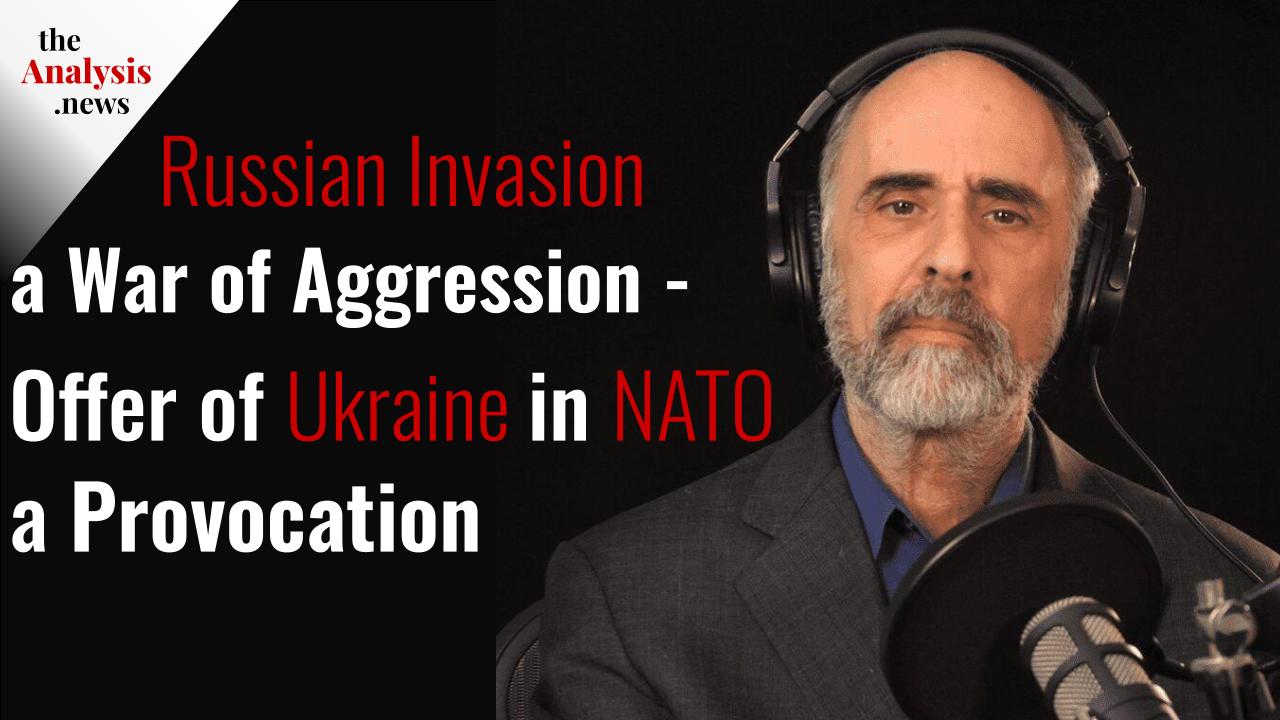


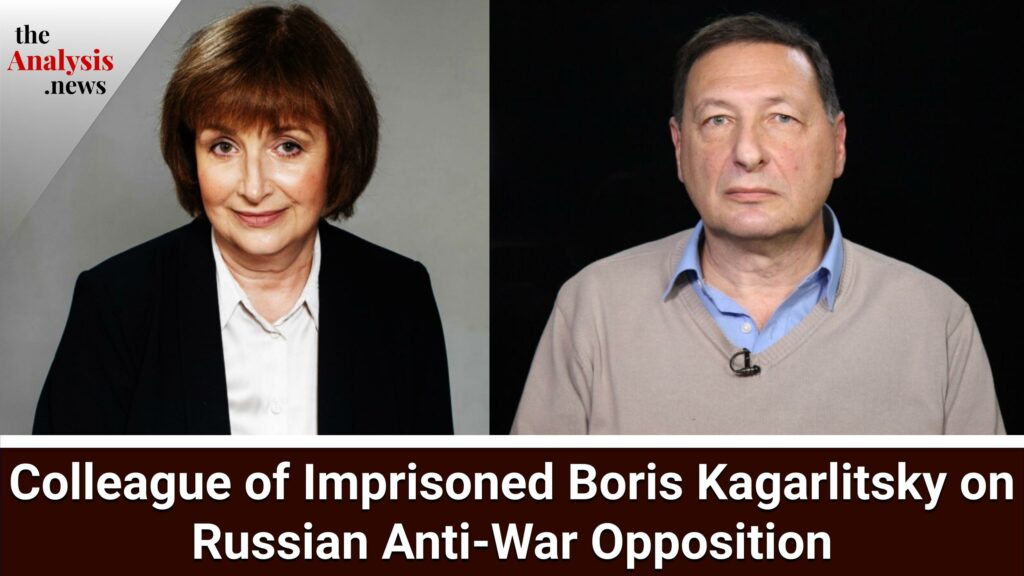
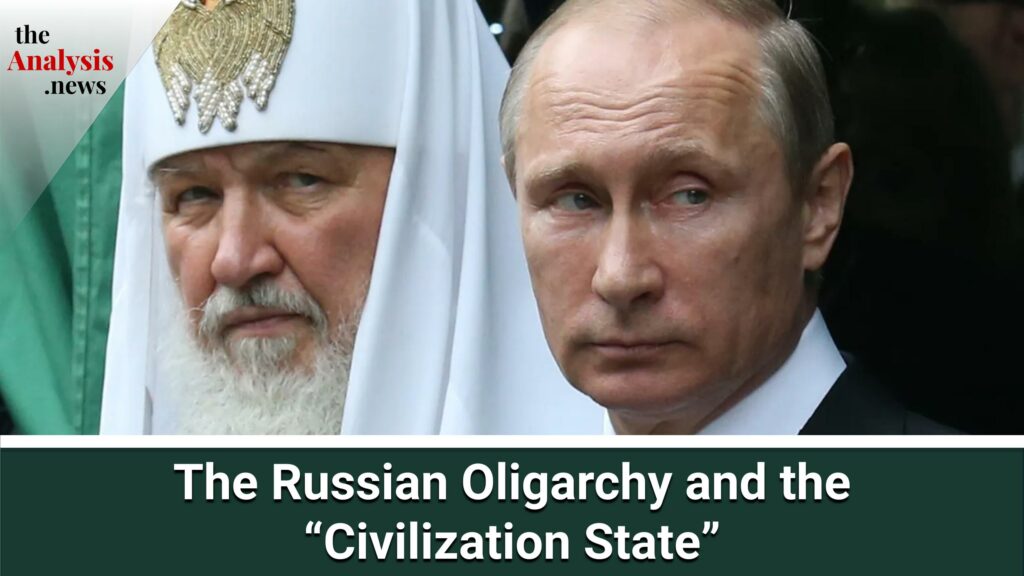
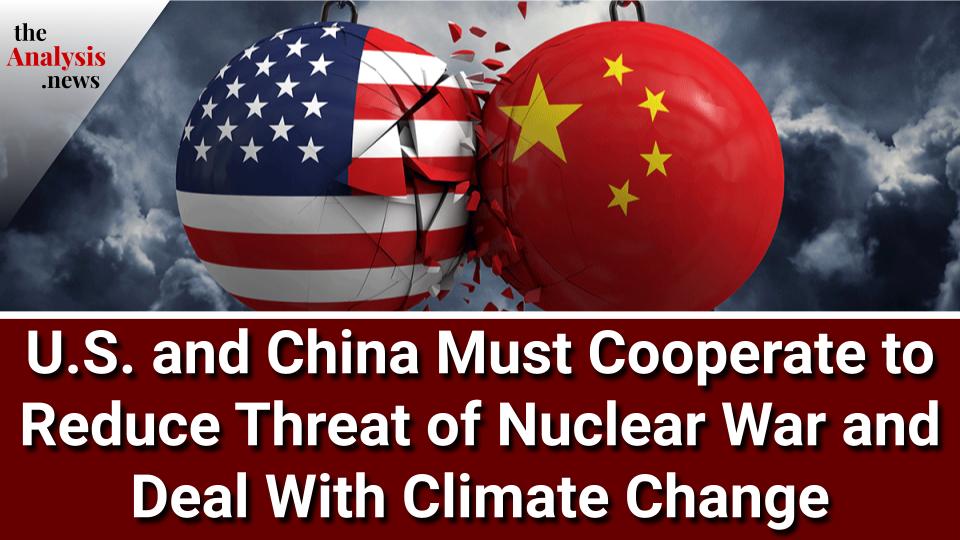
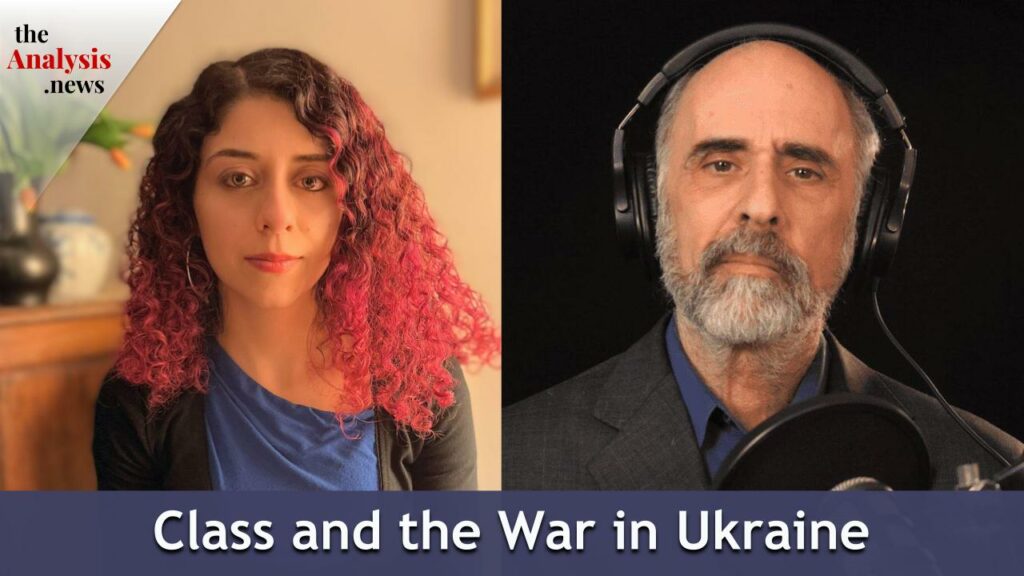
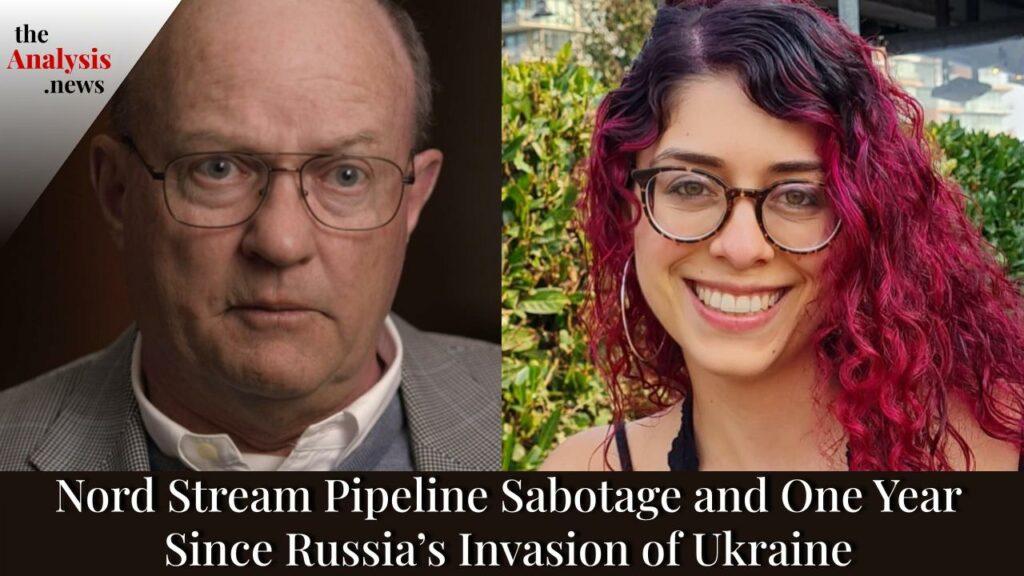
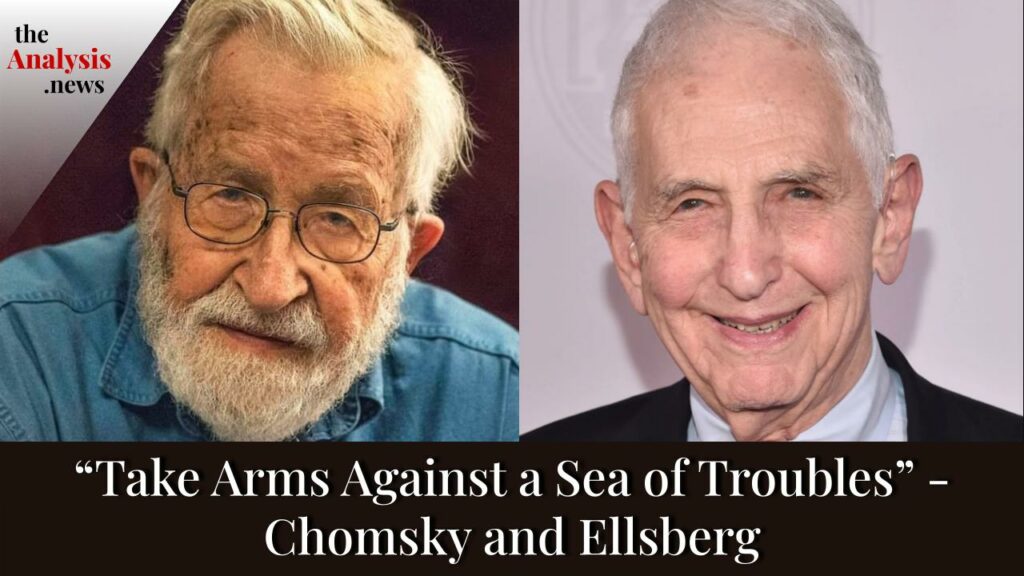
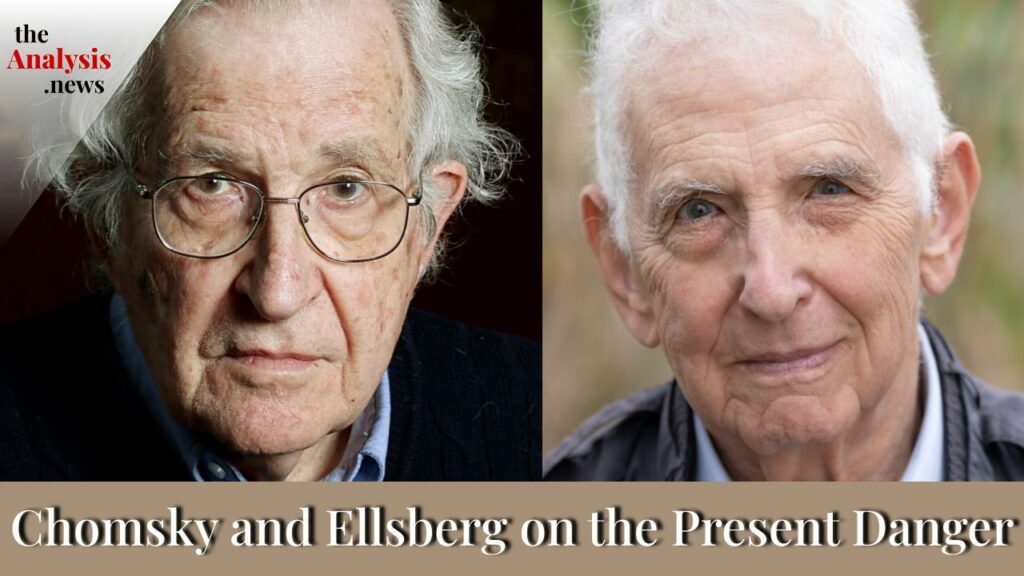
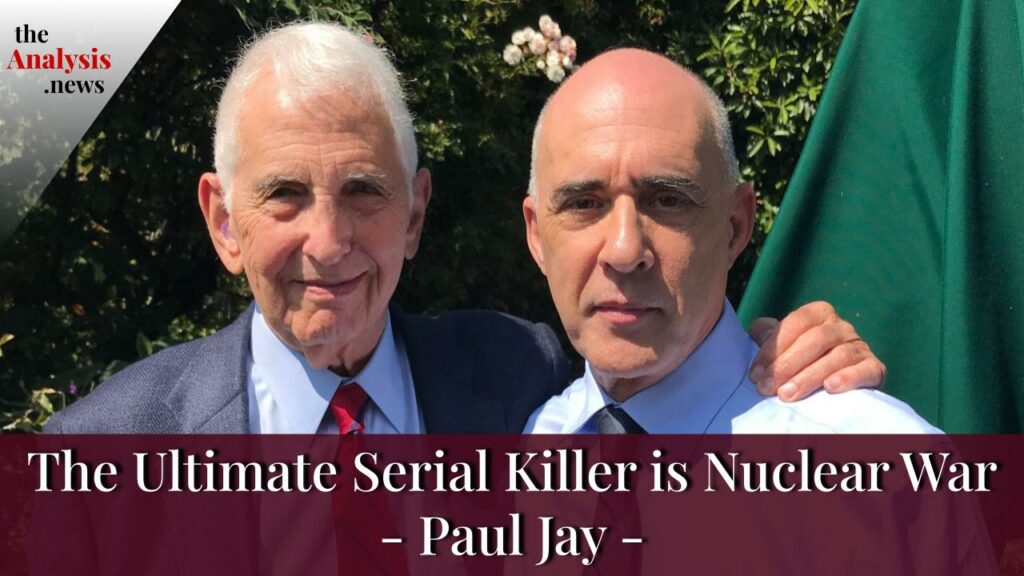

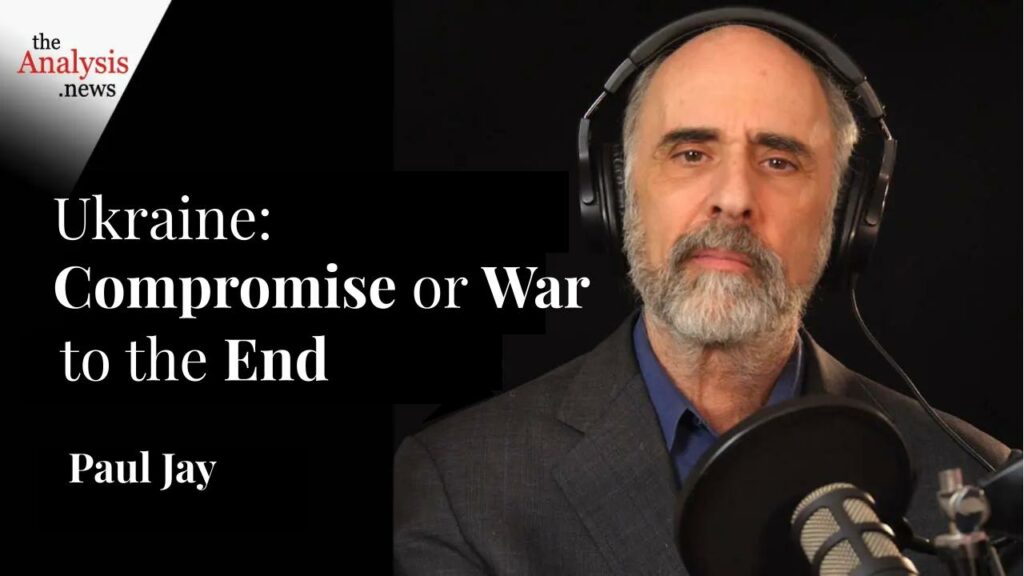
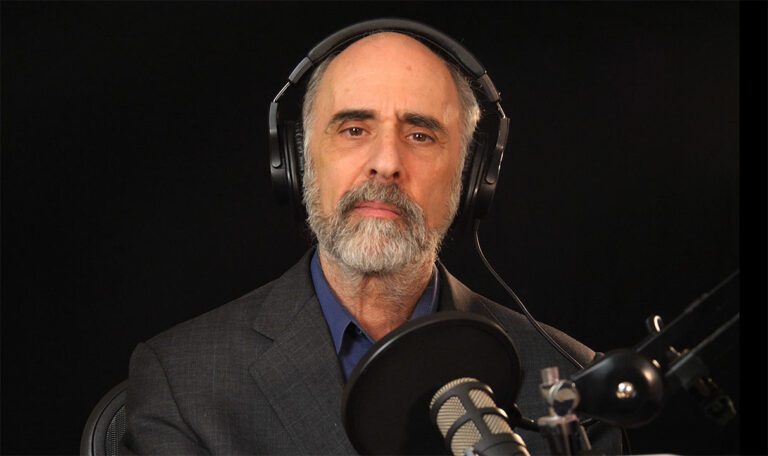

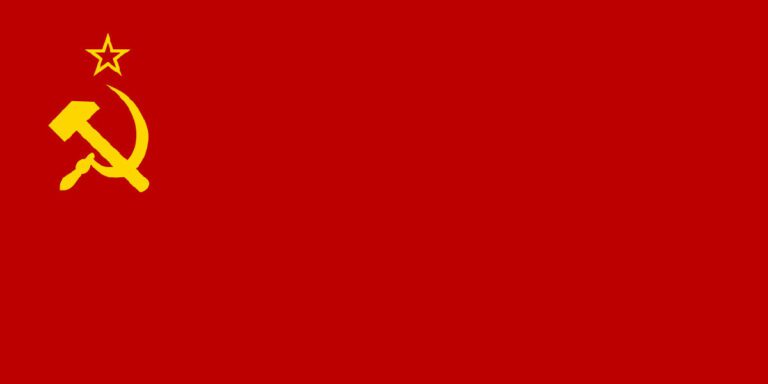
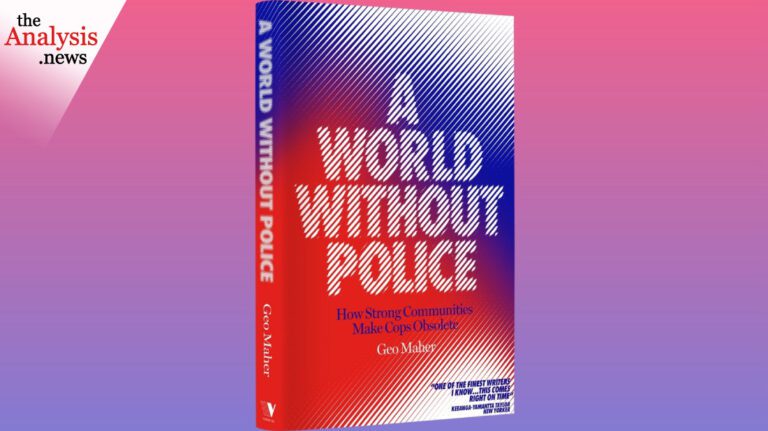
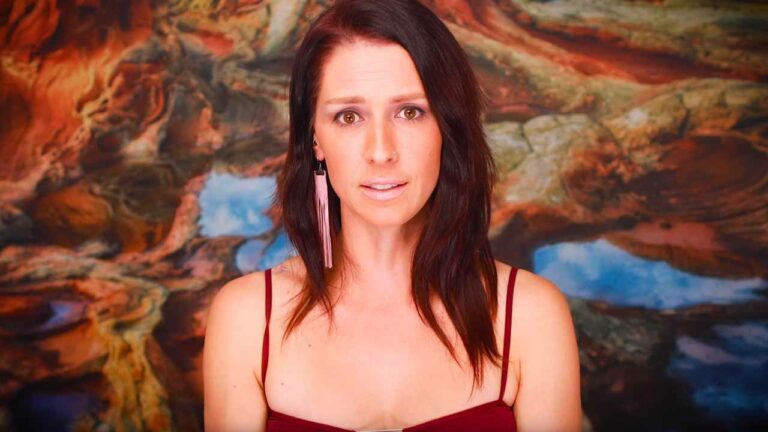
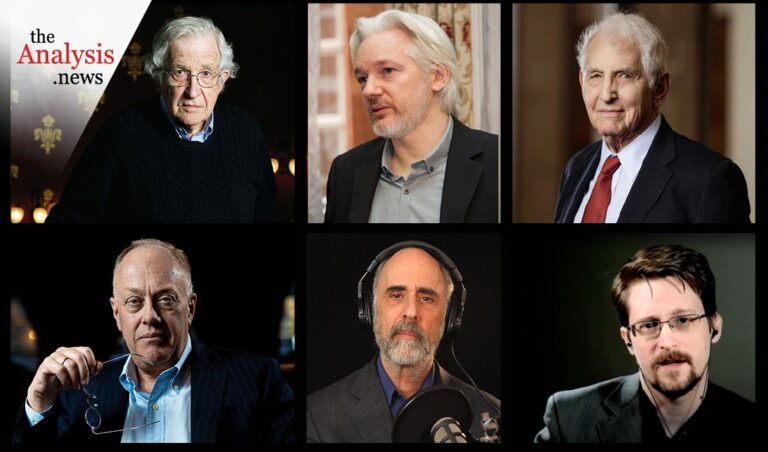
Whenever calling out Russia for its war crimes in Ukraine, the depth of the United States responsibility for this war has to be stated in the same breath, as well. The proper emphasis needs to be put on this. I don’t know how any peaceful resolution is found, actually, without acknowledging and emphasizing this.
You don’t have to dig very deep into the historical record to come to the conclusion that the US, short of firing the first shots, really seemed to be doing everything it could to start this war. I really think, if it had not been for the United States’ truly relentless antagonization, on its own and through NATO, this war would not have happened. Up until 2014, Russia seemed fine to exert its influence on Ukraine via non-military, non-violent means. In 2014 the US’s acknowledged billions in previous opposition funding paid off, and things went to hell.
The 2003 invasion of Iraq is acknowledged even in the mainstream now as a horrendous undertaking, built on lies. The ulterior motives and depth of the deception are known. The alliance of forces in the US wanted the war, and they didn’t really care what the facts or justification were. Well, the same forces that propelled that war still exist in the United States. As crazy as it may sound to the uninitiated, the United States tries to create conflicts.
Well they have succeeded in Ukraine. They had full knowledge of what their provocations would result in, from their own people and many Russians besides Putin. And they did it anyway.
Another great interview. I really appreciate Paul’s perspective on such a broad spectrum of issues. I would love to learn what are your views regarding the failure of most people to act in any way with regard to reducing the probability of nuclear war. That question may be a good start for a documentary….
Rules of game is changing.
New players(BRIKS)+ play the game differently from US.
China has totally different understanding of doing business, Including all to benefit from engaging in business. Therefor world may be a bit better than what it is now.